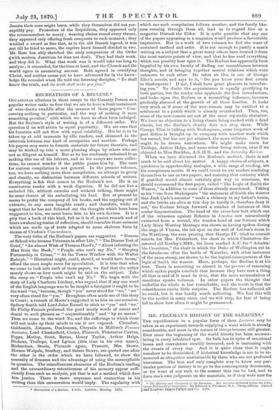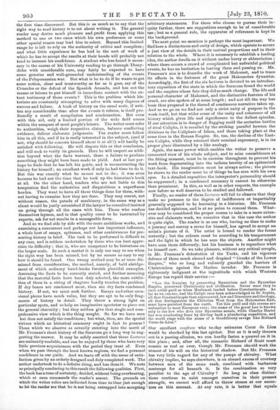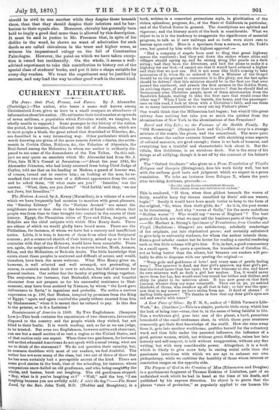MR. FREEMAN'S HISTORY OF THE SARACENS.* THE republication in a
popular form of these Lectures may be taken as an experiment towards supplying a want which is already considerable, and must in the nature of things become still greater. Ever since the beginning of the world history has been accumu- lating in every inhabited spot. Its bulk has in spite of occasional losses and convulsions steadily increased, and is increasing with the events of every day. And it is quite clear that it ought somehow to be diminished, if historical knowledge is not to be re- nounced as altogether unattainable by those who are not professed historians. The best and only complete way to know any par- ticular portion of history is to go to the contemporary documents, or for want of any such to the nearest that can be had, and to form one's own judgment on the materials, as if they were now for
• The History and Conquests of the Saracens : Six Lectures delivered before the Edin- burgh Philosophical Institution. By Edward A. Freeman, M.A. Cheap edition. Oxford use Lyndon: James Parker and Co. IWO.
the first time discovered. But this is as much as to say that the right way to read history is to set about writing it. The general reader may derive much pleasure and profit from applying this method to one or two cases which his own preference or some other special reason may lead him to select. Beyond this limited range he is left to rely on the authority of critics and compilers ; and what little experience he has had in the sort of work of which he has to accept the results at their hands will probably not tend to increase his confidence. A student who has found it neces- sary in the course of his University reading to go through Thacy- dides with considerable care, may fairly be expected to have some genuine and well-grounded understanding of the events of the Peloponnesian war. But what is he to do if he wants to get some notion, clear and trustworthy as far as it goes, say of the Crusades or the defeat of the Spanish Armada, and has not the means or leisure to put himself in immediate contact with the ex- tant testimony of those events ? This is the problem which his- torians are constantly attempting to solve with many degrees of success and failure. A book of history on the usual scale, if writ- ten any considerable time after the events it relates, is itself pro- fessedly a result of compilation and condensation. But even with this aid, only a limited portion of the wide field comes
within the compass of most people's leisure. The writer must refer to authorities, weigh their respective claims, balance conflicting
evidence, deliver elaborate judgments. The reader must follow him in all this, and if he is really interested in the subject, (and if not, why should he concern himself about it at all?) will hardly be satisfied with following. He will dispute this or that conclusion, and will seek to verify its grounds. Here he will suspect an addi- tion beyond what the facts warrant, there a failure to produce something they might have been made to yield. And at last per- haps he finds that he has left his guide, and is reconstructing the history for himself ; an excellent work if only he had time to do it.
But this was exactly what he meant not to do ; it was even because he had not the time that he took up the historian's book at all. On the other hand, readers who are not liable to this temptation find the authorities and disquisitions a superfluous burden. They want to have all these things done for them, with- out having to examine how they are done. They may resent, not without reason, the parade of machinery, in the same way as a client would be justly astonished if the lawyer he consulted insisted on going through all the cases with him. Those who confess themselves laymen, and in that quality come to be instructed by experts, ask for net results in a manageable form.
And so we find side by side with the more ambitious works, and exercising a concurrent and perhaps not less important influence, a whole host of essays, epitomes, and other contrivances for pre- senting history in brief. The task to be performed is difficult in any case, and is seldom undertaken by those who can best appre- ciate its difficulty ; that is, who are competent to be historians on
the larger scale. In such a matter it is only too easy to see when the right way has been missed, but by no means so easy to say
how it should be found. One wrong method may be at 'once dis- missed from consideration, the method, namely, of bald abridge- ment of which ordinary hand-books furnish plentiful examples.
Assuming the facts to be correctly stated, and further assuming that the material facts have been duly selected, the mere exhibi- tion of them in a string of chapters hardly touches the problem.
If dry bones are condensed meat, then are dry facts condensed history. If not, we must seek further. Essays and other occa- sional pieces have much value, but they are apt to be only frag- ments of history in detail. They throw a strong light on particular spots, and so help an imaginative spectator to piece out the general obscurity ; but they seldom give that single and com- prehensive view which is the thing sought. So far we have seen hat does not satisfy the conditions ; but what, then, are the special virtues which an historical summary ought in fact to possess ?
Those which we observe as actually entering into the merit of
Mr. Freeman's short history of the Saracens go a long way in sug- gesting the answer. It may be safely asserted that these Lectures
are eminently readable, and can be enjoyed by those who have very little previous acquaintance with the period they treat of. Even when we pass through the least known regions, we feel a personal confidence in our guide. And we leave off with the sense of satis- faction given by an orderly designed and duly completed work. The author undertook to do a definite thing, and has done it. We note as principally conducing to this result the following qualities. First, the book has a tone of certainty, decided, without being overbearing, which at once commands the reader's assent. The grounds on which the writer relies are indicated from time to time jest enough to let the reader see that he is not being entrapped into accepting arbitrary statements. For those who choose to pursue their in- quiry further, there are suggestions enough to be of considerable use ; but as a general rule, the apparatus of references is kept in the background.
The next point we mention is perhaps the most important. We find here a distinctness and unity of design, which operate to secure a just view of the details in their mutual proportions and in their relation to the whole. Where it is necessary to establish a leading idea, the author dwells on it without undue hurry or abbreviation ; where there occurs a crowd of complicated but unfruitful political events, he has no hesitation in leaving them and passing on. Mr. Freeman's aim is to describe the work of Mahomet, and to trace its effects in the fortunes of the great Mahometan dynasties.
Accordingly, the first of the six lectures is devoted to an introduc- tory exposition of the state in which the Saracens found the world and the empires whose fate they did so much change. The life and personal character of Mahomet, and the distinctive features of his creed, are also spoken of at some length ; and not till the way has been thus prepared is the thread of continuous narrative taken up. And as we go on we find not only a strict unity of purpose in the work itself, but that wider sense of the unity and coherence of all history which gives life and significance to the dullest episodes.
If our attention is in danger of flagging amid the sectarian battles of rival Caliphs, it is recalled by the striking parallel beween the divisions in the Caliphate of Islam, and those taking place at the same time in the Roman Empire. So, too, the decline of the East- ern Caliphs, while they retained their nominal supremacy, is in its proper place illustrated by a like analogy.
Again, the same power which enables the writer to preserve a connected view of his whole subject, and to seize resemblances at the fitting moment, must be in exercise throughout to prevent his work from degenerating into the tedious brevity of an epitomized text-book. His imagination must be always active ; the picture he shows to the reader must be of things he has seen with his own eyes. In a detailed exposition the interpreter's personality should be suppressed ; in a condensed summary it cannot be otherwise than prominent. In this, as well as in other respects, the example now before us well deserves to be studied and followed.
Finally, no reader of these Lectures will fail to observe that they
make no pretence to the degree of indifference or impartiality generally supposed to be becoming in a historian. Mr. Freeman has decided opinions, and is at no pains to conceal them. What- ever may be considered the proper course to take in a more exten- sive and elaborate work, we conceive that in this ease the author is quite right. The reader is as one who, having no time to make a journey and survey a scene for himself, has agreed to accept an artist's picture of it. The artist is bound to render the forms correctly ; but the colours must be according to his temperament and the light in which he has seen the objects. Another might
have seen them differently, but his business is to reproduce what he himself saw. So we take pleasure, without any critical scruple, in Mr. Freeman's detestation of the Turks, and his vigorous defence of those much abused and despised "Greeks of the Lower Empire," who so long and valiantly guarded the barriers of Christendom against the Moslem invader. Mr. Freeman is righteously indignant at the ingratitude with which Western Europe has repaid their service :— " Leo the Isaurian by preserving Byzantium and the Byzantine Empire, preserved Christianity and civilization. Never were they in such awful peril as when Moslemah landed before Constantinople. As far as we can see, had the Caliph once been acknowledged in St. Sophia, all that Constantinople then represented, law and literature and theology, all that distinguishes the Christian West from the Mahometan East, must have perished from the earth. Yet this peril and this rosette are unfamiliar to most European ears ; the name of the great Leo is known only to the few who dive into Byzantine annals, while Charles Martel has won everlasting fame by driving back a plundering expedition, and the world rings with the name of a bloodthirsty savage like Richard Coeur-de-Lion."
Our excellent confrere who to-day estimates Coeur de Lion would be shocked by this last epithet. But as it is only thrown out in a passing allusion, we can hardly fasten a quarrel on it in this place ; and, after all, the romantic Richard of Scott must remain as real as ever, though Mr. Freeman should work the utmost of his will on the historical shadow. But Mr. Freeman has very little regard for any of the pomps of chivalry. What chivalry implies, he says elsewhere, is an absurd excess of courtesy between men of the same rank, combined with barbarous contempt for all beneath it. Is the combination so very peculiar to the age of Chivalry ? So long as class distinc- tions continue to exist amongst ourselves in their present strength, we cannot well afford to throw stones at our ances- tors on this account. At any rate, it is better that equals
should be civil to one another while they despise those beneath them, than that they should despise their inferiors and be bar- barous to their equals also. Moreover, chivalry has generally been held to imply a good deal more than is allowed by this description. It must be said in justice to Mr. Freeman that, in spite of his dislike to the word, he shows no want of admiration for such deeds as are called chivalrous in the truer and higher sense, as witness his impassioned eulogy on the fall of Constantine Palmologus. However, the point on which we have taken excep- tion is raised but incidentally. On the whole, it seems a well- advised experiment to take this contribution to history out of the special class of students' books, and put it into a shape suitable for every-day readers. We trust the experiment may be justified by success, and may lead the way to other good work in the same kind.
































 Previous page
Previous page